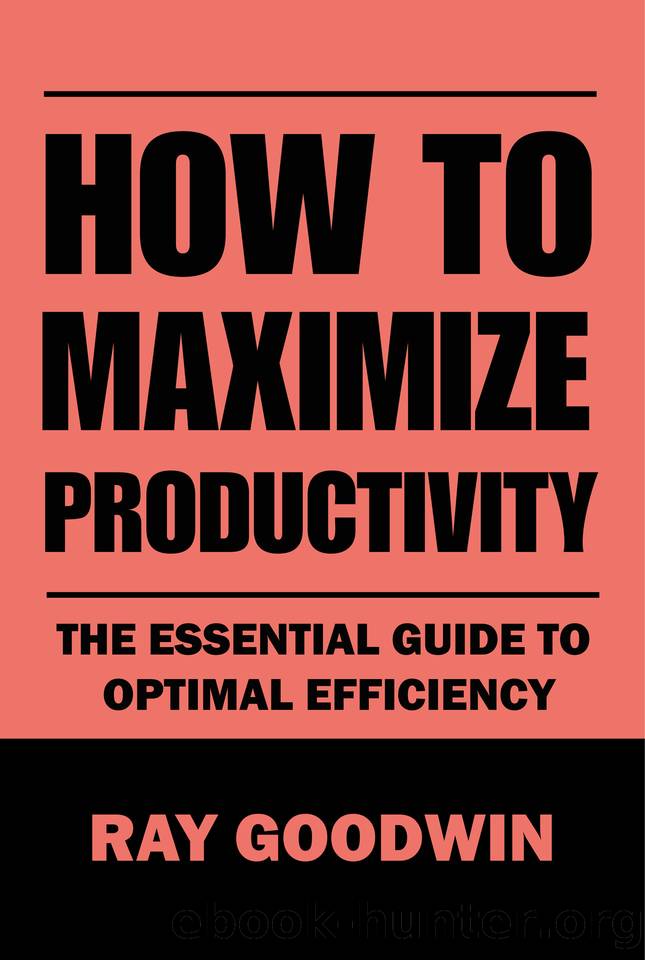How To Maximize Productivity: The Essential Guide to Optimal Efficiency by Goodwin Ray

Author:Goodwin, Ray
Language: eng
Format: epub
Published: 2023-07-16T00:00:00+00:00
Chapter 12: Emotional Intelligence and Productivity
Emotional intelligence (EI) is the ability to recognize and manage one's own emotion, and also the emotion of others. EI plays a vital role in driving productivity, and establishing a productive, collaborative and positive work environment.
Understanding Emotional Intelligence
EI is the ability of a person to recognize their emotions, respond to them appropriately, and also to recognize other people's emotions, and to be able to respond to them effectively. There are broadly four key elements to EI:
â Self-awareness: It is the ability to recognize and understand one's own emotions, strengths, and weaknesses.
â Self-regulation: It is the ability to control one's emotions, and manage one's impulses, especially in difficult situations.
â Social awareness: Also known as emotional empathy, it is the ability to recognize and understand the emotions, needs and concerns of others through reading verbal and non-verbal communication.
â Relationship management: It is the ability to communicate effectively, build and maintain relationships, and resolve conflicts with empathy, and collaboration.
The Importance of Emotional Intelligence in Productivity
There is a significant correlation between EI and productivity, as it helps in reducing stress levels, establishing a positive work environment, maintaining effective communication, and building strong relationships. People with high EI are generally better at managing difficult work situations, creating a productive work culture, and building strong and positive work relationships.
Techniques for Developing Emotional Intelligence
Developing EI is an ongoing process, and it can be achieved through these techniques:
â Building self-awareness: To build self-awareness, take time for reflection, identify your strengths, and areas where you need improvement. This will help you to be more aware of your own emotions, and moods, allowing you to manage them effectively.
â Managing stress levels: Everyone experiences stress, but individuals with high EI are better at managing them. Practice mindfulness, meditation and be aware of your physical and emotional triggers to control your stress levels.
â Active Listening: Pay attention to what others are saying and understand their perspective. Show empathy towards your co-workers and try to put yourself in their shoes to better understand their feelings.
â Developing a product mindset: Develop a mindset that focuses on the process of achieving a goal, rather than just the goal itself. By focusing on the process and the journey, you can learn from each step to get better and evolve over time.
â Building empathy: Try to understand how others think and feel. Take the time to learn about different perspectives and use active listening techniques to understand the needs and feelings of others.
Tips for Managing Emotions in the Workplace
To manage emotions effectively in the workplace, consider the following tips:
â Be self-aware: Track your emotions and identify what triggers them in the first place. Know your own emotional responses and how they have the ability to impact the work environment or colleagues.
â Practice mindfulness: Be aware of whatâs going on around you, and take time to focus and redirect your energy. This can be achieved through simple mindfulness techniques such as deep breathing or meditation.
â Be patient: Be patient with yourself and others.
Download
This site does not store any files on its server. We only index and link to content provided by other sites. Please contact the content providers to delete copyright contents if any and email us, we'll remove relevant links or contents immediately.
Buy Back Your Time: Get Unstuck, Reclaim Your Freedom, and Build Your Empire by Dan Martell(631)
Hypnotic Selling Secrets by Joe Vitale(589)
Contemporary Reflections on Business Ethics by Ronald Duska Norman E. Bowie Patricia H. Werhane(524)
How to Have the Energy by Colette Heneghan(518)
How To Feel Good With Productivity: Overcome Procrastination Lead With A Vision, Manage Your Time, Increase Productivity, And Do What Matters Most by L. Solari Alfred(455)
Delegating effectively by Unknown(452)
Tribal Wisdom for Business Ethics by Grace Ann Rosile(451)
Bullet Journaling by Silvia Rose(436)
On Being a Dictator by Kevin J. Anderson & Martin L. Shoemaker(429)
Enjoy Time by Catherine Blyth(393)
Authentic Success by Robert Holden Ph.D(391)
How To Maximize Productivity: The Essential Guide to Optimal Efficiency by Goodwin Ray(388)
The Fourth Decision by Nelson Randy H.;(382)
Dopamine Detox: Guide On How To Rewire Your Brain and Live A Life Of Digital Minimalism, Quit Social Media, Do Hard Things, Improve Your Memory, Concentration, And Productivity by Harris Christopher(379)
Leading From The Heart by Scott Joan(362)
Your Time, Your Way by Carl Pullein(354)
The Selfish Romantic by Michelle Elman(353)
Success--Discovering the Path to Riches by Napoleon Hill(351)
Passage Planning Principles by Unknown(346)
